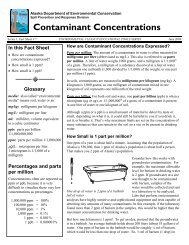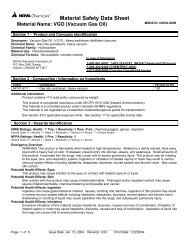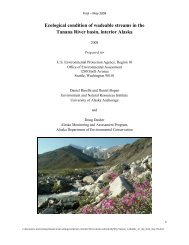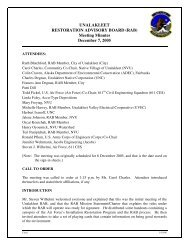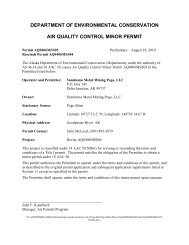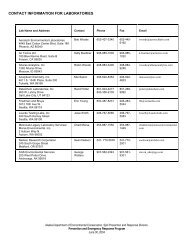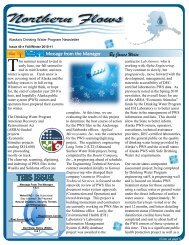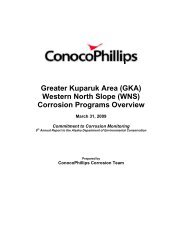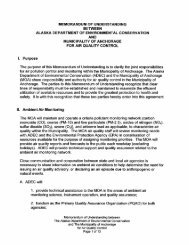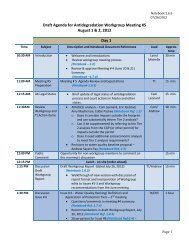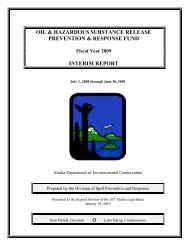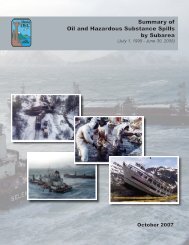2012 Ocean Ranger Guidebook Revision 3-7-12 - Alaska ...
2012 Ocean Ranger Guidebook Revision 3-7-12 - Alaska ...
2012 Ocean Ranger Guidebook Revision 3-7-12 - Alaska ...
Create successful ePaper yourself
Turn your PDF publications into a flip-book with our unique Google optimized e-Paper software.
<strong>20<strong>12</strong></strong> <strong>Ocean</strong> <strong>Ranger</strong> <strong>Guidebook</strong> 3-7-<strong>12</strong><br />
Q. Training and Educational Materials<br />
Training is an important and ongoing part of every position and tasking onboard cruise<br />
ships. Not only is training necessary for the safe and economical operation of a ship, it is<br />
required by numerous international conventions and flag state regulations. The<br />
International Convention on Standards of Training Certification and Watchkeeping<br />
(STCW) for example, sets forth requirements for knowledge, experience and<br />
demonstrated competency for licensed officers of the deck and engineering departments<br />
and for ratings forming part of the navigation or engineering watch. Equivalent national<br />
standards apply to ships in United States registry. These detailed requirements address<br />
not only the navigation of the ship but also the proper operation of the shipboard<br />
machinery and knowledge of and ability to assure compliance with the environmental<br />
protection requirements of MARPOL and the safety regulations of The International<br />
Convention on Safety of Life at Sea (SOLAS). SOLAS also requires that the ship’s<br />
training manual (which contents are prescribed by regulation) be placed in the crew<br />
messes and recreation rooms or in individual crew cabins.<br />
CLIA member lines have developed programs that raise the level of environmental<br />
awareness on the part of both the passengers and the crew. Each ship’s crew receives training<br />
regarding shipboard safety and environmental procedures. Advanced training in shipboard<br />
safety and environmental management procedures is provided for those directly involved in these<br />
areas. Those directly responsible for processing wastes are given specific instruction in their<br />
duties and responsibilities and in the operation of the various equipment and waste management<br />
systems. Specific actions that our member lines have taken to train employees and increase<br />
passenger awareness include:<br />
a. Announcements over the public address system and notices in ship newsletters that<br />
caution against throwing any trash overboard,<br />
b. Signage and colorful posters placed in crew and passenger areas encouraging<br />
environmental awareness and protection,<br />
c. Safety and environmental information booklets in crew cabins and crew lounges,<br />
d. Regular meetings of ship safety and environmental committees consisting of officers<br />
and crew from all departments to review methods of improving performance,<br />
including better and more effective environmental practices.<br />
For ships on an international voyage, STCW, SOLAS, the International Management<br />
Code for the Safe Operation of Ships and for Pollution Prevention (ISM Code), require that<br />
training be fully documented. Individual training is documented in each crewmember’s file. Ship<br />
training exercises, such as fire drills and emergency response exercises, are documented in the<br />
appropriate ship’s logs. All of these training documents are required to be available for oversight<br />
examination by both the ship’s flag state inspectors and by port state authorities such as the<br />
United States Coast Guard.<br />
Placards warning of the prohibition of the discharge of oil are posted on all ships<br />
operating in the navigable waters of the United States as required by U.S. Coast Guard<br />
regulations (33CFR155.450). Additionally, as part of required shipboard waste management<br />
plans, both Coast Guard regulations (33CFR151.59) and MARPOL (Annex V Regulation 9)<br />
require the posting of placards that notify the passengers and the crew of the disposal<br />
requirements for garbage. These placards are to be written in the official language of the State<br />
whose flag the ship is entitled to fly and also in English or French if neither of these is the official<br />
145



